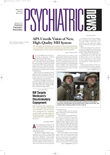Registrants praised APA’s 2002 Institute on Psychiatric Services (IPS) meeting in Chicago last fall, which boasted almost 200 sessions, including ones on disaster response, leadership and career development for early career psychiatrists, and HIV/AIDS.
Meeting attendance levels were higher than they were at the 2001 IPS meeting in Orlando, which fell on the heels of the September 11, 2001, terrorist attacks. Last year, 1,751 people— including exhibitors, press, and staff—gathered in Chicago. About 300 fewer people traveled to the 2001 IPS meeting.
A report from APA’s Department of Continuing Medical Education highlighted these and other data from the meeting, including comments from attendees. Kathleen Debenham, M.A., who is director of that office, prepared the annual report. General evaluation forms were placed in all registration packets and distributed to attendees at a variety of locations during the meeting. In addition, forms were mailed to nonrespondents after the meeting.
The most popular format for completing IPS evaluation forms was the computerized survey, which rewarded respondents with a personalized attendance certificate.
Most of those who filled out the general evaluation—96 percent—rated the overall quality of the educational sessions as excellent, and 99 percent agreed that the sessions met their educational objectives. About 86 percent of registrants thought that the industry-supported symposia provided a balanced view of the topics covered, though 95 percent said that within the sessions, multiple views were presented.
Psychiatrists made up the highest percentage of the 1,400 registrants at the meeting (41 percent), followed by residents (9 percent). Psychologists, social workers, occupational therapists, and nurses combined accounted for 10 percent of registrants. An even larger proportion of registrants were grouped in the “unknown” category (19 percent), which included guests and spouses of registrants and “other” (15 percent), of which marriage and family counselors were a part.
“The Scientific Program Committee selected sessions that were very well received,” Debenham told Psychiatric News. Paula Panzer, M.D., chaired the committee. “The meeting’s success was also due in large measure to the active role taken by leaders of the Illinois district branch,” Debenham added.
Illinois district branch members Shastri Swaminathan, M.D., and Thomas A. Simpatico, M.D., she said, promoted the meeting, coordinated IPS activities with local medical schools, and identified local speakers who shared their expertise with meeting attendees.
The meeting included 12 industry-supported symposia, 11 CME courses and two full-day sessions. One full-day session dealt with the psychiatric dimensions of HIV/AIDS, and the other discussed clinical approaches to working with homeless, mentally ill individuals.
Acting on suggestions from attendees at the 2001 meeting, the APA Scientific Program Committee included more sessions on disaster response, children’s mental health, and substance abuse.
This year’s Institute on Psychiatric Services will be held in Boston from October 29 to November 2.
Information about the 2003 institute is posted on APA’s Web site at www.psych.org/sched_events/ips03/index.cfm. ▪
